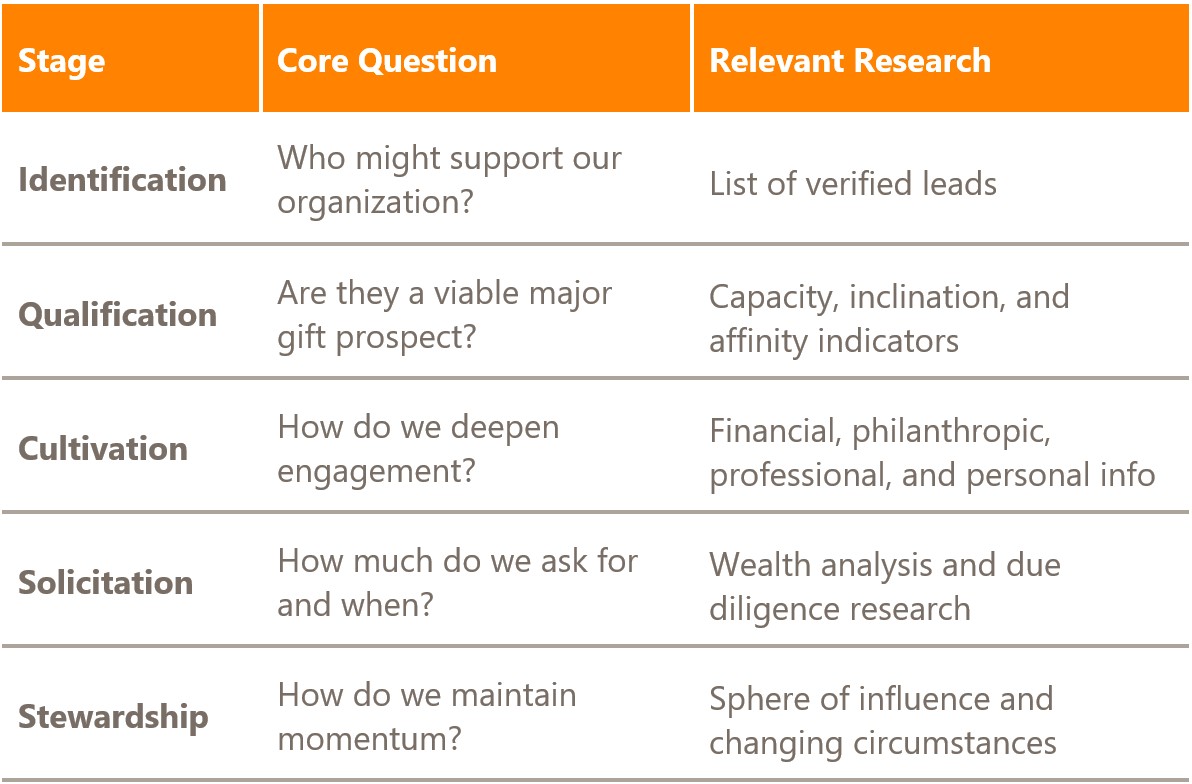Prospect Research
Prioritize Purpose with Stage-Based Research
By Catherine Flaatten | November 06, 2025
Prioritize Purpose with Stage-Based Research
How many times have you gotten a prospect research request that feels like overkill? Or one that’s not even close to what’s actually needed? Or one that’s so vague, you don’t know where to start?
Traditional request models are often designed with the same major flaw: they rely on gift officers to translate their frontline strategy needs into research deliverables. Lacking deep familiarity with research sources, methodologies, and products, gift officers may:
- Ask for more than is truly needed or helpful.
- Accidentally request the wrong deliverable.
- Give up interpreting and ask for “information” with no specifics.
- Check out and stop partnering with research altogether.
It’s a bit like a patient telling their doctor which lab tests they want. Instead, the patient is better served by describing what’s going on and trusting their physician to select the tests that will lead to a diagnosis.
So how do we design a research system more like the latter scenario? By implementing a stage-based research framework that maps specific frontline needs to appropriate deliverables, relieves gift officers from having to translate their strategies into the research domain, and helps scale research across the pipeline.
Stage-Based Research
Stage-based research is fundamentally a basis for deciding what kinds of intelligence we should deliver and when. Instead of treating every request the same, this system aligns research deliverables with the stages of the donor cultivation cycle. To do this effectively, it’s critical to understand the specific questions that gift officers typically need answered at each stage in order to take the next step in building the donor relationship. Then we can apply our research expertise to identify the right deliverables that will answer these key questions most efficiently and effectively.
There are several benefits of a stage-based research system. First, it aligns research directly with fundraising strategy—so we’re not just gathering information; we’re driving decisions and actions. This approach shifts research from service provider to strategic partner. It also moves the focus from “what” (deliverable) to “why” (purpose), relieving gift officers from the burden of figuring out for themselves how to get what they really need. And finally, this approach helps prospect research scale our impact. When research is tailored and right-sized to each stage, we can stretch our limited resources further without compromising quality.
Questions as Guideposts
The first step towards implementing stage-based research is to define the core questions a gift officer most often has at a given stage. This is a great opportunity to partner with your frontline fundraisers to ground-truth your understanding of the core questions. The results can then be organized into a table with your recommendations on the most relevant research to answer each question; for example:

Next, refine your research deliverables (both content and format) to match the new framework. To answer a question like, “Who can help me build a relationship with this prospect?”, your gift officer probably doesn’t need a long list of names with titles and ratings. They really need the top three to five connections you found, the nature and relative strength of those connections, and contact information to get in touch with each of them. Ensure your deliverables are tightly focused on purpose and action.
Then, design a request intake system to gently but firmly guide gift officers through the new framework. The key here is to remove the requestor’s ability to select a specific research product. Instead, require the gift officer to indicate both the prospect stage and the purpose of their request: is it to inform their cultivation strategy? Prepare for an upcoming visit? Refine the solicitation timing and/or amount? Pair this information with the stage to pinpoint the questions that need to be answered and tailor your deliverable to this purpose.
Flexibility vs. Fidelity
Like any system, stage-based research is intended to handle ~90% of cases. However, some flexibility will be appropriate in certain cases:
- Leadership requests. At most organizations, the VP gets what the VP wants—that’s just the way it is.
- Principal gift prospects. Given the heightened difficulty of getting in the door with these prospects, some extra research in earlier stages may be warranted.
- Fast-moving opportunities. We don’t want to be the cause of delays, so providing the next level of research proactively could be a strategic move.
- Complex assets/vehicles. Noncash gifts are often inherently more complicated and may require more advance planning than typical income-funded gifts.
- Due diligence concerns. Red flags should be investigated early to avoid going down a road that will ultimately come to a dead end.
That said, when a misaligned request hits your desk and it doesn’t appear to merit flexibility, you’ll need to figure out how to hold the line. First, get out of your inbox and connect with the requestor face-to-face (or at least voice-to-voice). Invite them to share more information about their request, focusing on their purpose: what are they hoping this research will help them do? Summarize what you’re hearing and then connect it back to your framework, helping them understand how stage-based research actually does serve their purpose. If you’re still getting pushback, consider these tactics:
- Sweeten the deal. “If you agree to work within the system on this request, I can get you the results in two days instead of five.”
- Make a trade. “I can make an exception for you this time, but I’m going to need an extra week to complete the other request I’m working on for you.”
- Escalate to management. “It seems like we’re at an impasse. I’d like to bring our managers into the conversation to help find a solution that works for both of us.”
Prioritize Purpose
By matching our work to the frontline’s strategic needs at each point in the process, we can focus our efforts on where they will have the most impact—and avoid wasting time on excessive, misaligned, or vague requests. Over time, this will position research as a true partner and establish stage-based, right-sized research as the standard for high-quality frontline support.


Catherine Flaatten
Associate Vice President of Prospect Development, BWF
Catherine Flaatten, MPH, CFRE, is the associate vice president of prospect development at BWF, where she advises nonprofit clients on building and strengthening programs in prospect research, management, and analytics. Her consulting is grounded in past practitioner experience at The George Washington University, Share Our Strength/No Kid Hungry, the National Psoriasis Foundation, and the BrightFocus Foundation.
Catherine serves on Apra International’s Board of Directors, Education and Professional Development Committee, and Fundamentals Committee, and has held numerous volunteer leadership roles with Apra International, Apra Metro DC, and AASP. She is a frequent presenter and author in the field, and her expertise has been featured in the Chronicle of Philanthropy.
Her contributions aim to position prospect development as a strategic driver of fundraising success and to strengthen the profession through knowledge sharing and leadership. She earned both her BA in International Affairs and her MPH in Maternal and Child Health from The George Washington University.